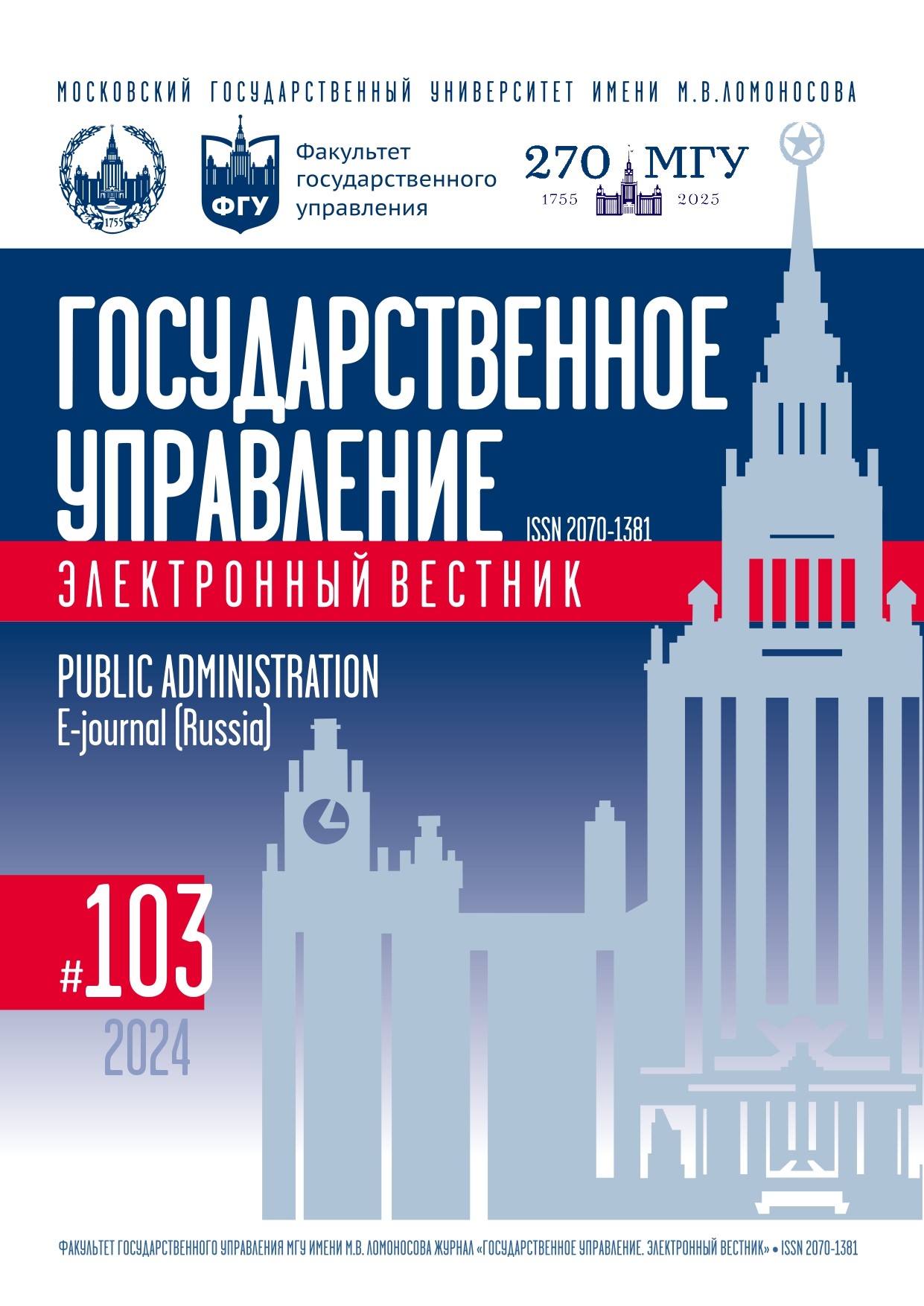State Youth Policy in Recruitment System of Political Leader
Keywords:
Youth, state youth policy, youth political leadership, recruitment system, state policy, political elite.Abstract
The article contains the results of a study, the aim of which was to identify the role of youth policy in the system of recruiting political leaders. In the text, the authors analyze the features of the formation and stages of development of youth policy as a part of state policy aimed at supporting young people and realizing their interests. The article describes existing programs and projects designed not only to support young people, but also to help identify, develop and support their political potential and, consequently, the formation of youth political leadership in Russia. The paper presents the results of an expert survey conducted by the authors in 2023, the aim of which was to determine the features of state youth policy as a tool for the formation and identification of the leadership potential of youth, as well as the integration of its representatives into the country’s political elite through the system of recruiting youth political leaders. As a result, the authors came to the conclusion that recently there has been an evolution of state youth policy in the indicated manner. It acts as the primary mechanism of socialization in the field of political leadership, providing opportunities for building a career in various fields of activity, including in the field of public policy and public administration. At the same time, as a result of the study, the authors came to the conclusion about the fragmented nature of its implementation, expressed in the difference between the declared and actual levels, which meanwhile makes it possible to build career trajectories and social elevators for a certain category of young people, forming the first level of the pool for recruiting political leaders.
References
Абрамов Г.А. Основные каналы рекрутирования молодёжи в политическую элиту современной России: возможности и пределы // Международное сотрудничество в целях устойчивого развития: Сборник статей Международной научной ассамблеи. М.: Межрегиональная общественная организация содействия изучению, пропаганде научного наследия Н.Д.Кондратьева, 2023. С. 9–14. DOI: 10.46865/978-5-901640-39-5-2023-9-14
Асеева Т.А., Шашкова Я.Ю. Особенности реализации молодежного политического лидерства в регионах РФ (на примере Алтайского края) // История и современное мировоззрение. 2021. Т. 3. № 1. С. 94–99. DOI: 10.33693/2658-4654-2021-3-1-94-99
Бааль Н.Б. Государственная молодежная политика как инструмент профилактики политического экстремизма в молодежной среде // Вестник Тверского государственного университета. Серия: Философия. 2021. № 2(56). С. 121–130. DOI: 10.26456/vtphilos/2021.2.121
Гаман-Голутвина О.В. Политические элиты России: вехи исторической эволюции. М.: РОССПЭН, 2006.
Горшков М.К., Шереги Ф.Э. Молодежь России: социологический портрет. М.: ЦСПиМ, 2010.
Государственная молодежная политика в России: социально-психологические основания и технологии реализации / под ред. С.Ю. Поповой. М.: Аквилон, 2019.
Гречихин В.Г. Современная молодежная политика в России // Гуманитарные, социально-экономические и общественные науки. 2021. № 5. С. 18–21.
Девочкина А.С., Палачева Ю.А. Государственная молодежная политика как инструмент формирования и развития профессиональной карьеры молодежи // Государственная молодежная политика: вызовы и современные технологии работы с молодежью: материалы Международной молодежной научно-исследовательской конференции. Екатеринбург: Издательство Уральского университета, 2021. С. 39–43.
Ильинский И.М. Проблемы молодежи и молодежной политики в условиях ускорения социально-экономического развития советского общества // Молодежь-86: сборник статей. М.: Высшая комсомольская школа при ЦК ВЛКСМ, 1987. С. 18–34.
Молодежное политическое лидерство в современной России / под общ. ред. А.В. Селезневой. М.: Аквилон, 2023.
Молодежное политическое лидерство в российских регионах / под ред. О.В. Поповой, Я.Ю. Шашковой. СПб.: Скифия-принт, 2020.
Мясоедова В.А. Формирование института молодежных политических элит в контексте политических преобразований в Российской Федерации // Вестник РУДН. Серия: Политология. 2016. № 4. С. 19–27.
Палитай И.С., Попова С.Ю., Селезнева А.В. Рекрутирование молодых политических лидеров в современной России: каналы, формы, технологии // Вестник Томского государственного университета. 2020. № 455. С. 68–77. DOI: 10.17223/15617793/455/10
Палитай И.С., Сокрюкин А.В. Формирование молодежных политических лидеров в современной России: проблемы и возможности // Южно-российский журнал социальных наук. 2023. Т. 24. № 1. С. 6–16. DOI: 10.31429/26190567-24-1-6-16
Попова О.В., Негров Е.О. Молодёжная политика глазами самой молодежи: проблема в PR? // Среднерусский вестник общественных наук. 2019. Т. 14. № 6. С. 37–58. DOI: 10.22394/2071-2367-2019-14-6-37-58
Селезнева А.В., Хаткевич А.А., Баранова Т.В. Молодежное политическое лидерство в современной России: определение теоретических оснований и концептуальной рамки исследования // Политическая экспертиза: ПОЛИТЭКС. 2023. Т. 19. № 2. С. 283–297. DOI: 10.21638/spbu23.2023.209
Смирнов В.А. Основные этапы формирования и реализации государственной молодежной политики в современной России // Вестник Московского университета. Серия 12. Политические науки. 2008. № 4. С. 51–62.
Karagianni D., Montgomery A.J. Developing Leadership Skills among Adolescents and Young Adults: A Review of Leadership Programmes // International Journal of Adolescence and Youth. 2018. Vol. 23. Is. 1. Р. 86–98. DOI: 10.1080/02673843.2017.1292928
Post J. Psychological Assessment of Political Leaders: Psychological Profiles of Saddam Hussein and William Jefferson Clinton. Ann Arbor: University of Michigan Press, 2003.
Redmond S., Dolan P. Towards a Conceptual Model of Youth Leadership Development // Child & Family Social Work. 2014. Vol. 21. Is. 3. P. 261–271. DOI: 10.1111/cfs.12146
Roberts K. Youth, Political Socialisation and Political Generations // Handbuch Kindheits-und Jugendsoziologie / ed by A. Lange, H. Reiter, S. Schutter, C. Steiner. Wiesbaden: Springer VS, 2015. Р. 1–12. DOI: 10.1007/978-3-658-05676-6_66-1
Short T. Workplace Mentoring: An Old Idea with New Meaning (Part 1) // Development and Learning in Organizations. 2014. Vol. 28. Is. 1. Р. 8–11. DOI: 10.1108/DLO-09-2013-0077
Winter D. Personality Profiles of Political Elites // Oxford Handbook of Political Psychology / ed. by N. Huddy, D.O. Sears, J.S. Levy. Oxford: Oxford University Press Inc., 2013. P. 423–458. DOI: 10.1093/oxfordhb/9780199760107.013.0014

